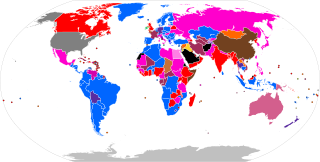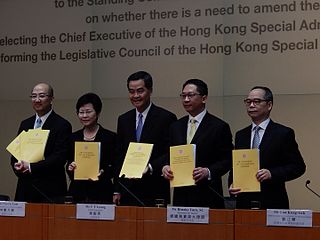Switzerland is a semi-direct democratic federal republic. The federal legislative power is vested in the two chambers of the Federal Assembly, the National Council and the Council of States. The Federal Council holds the executive power and is composed of seven power-sharing Federal Councillors elected by the Federal Assembly. The judicial branch is headed by the Federal Supreme Court of Switzerland, whose judges are elected by the Federal Assembly.
A referendum is a direct and universal vote in which an entire electorate is invited to vote on a particular proposal and can have nationwide or local forms. This may result in the adoption of a new policy or specific law. In some countries, it is synonymous with a plebiscite or a vote on a ballot question.

In political science, an initiative is a means by which a petition signed by a certain minimum number of registered voters can force a government to choose to either enact a law or hold a public vote in parliament in what is called indirect initiative, or under direct initiative, the proposition is immediately put to a plebiscite or referendum, in what is called a Popular initiated Referendum or citizen-initiated referendum.

Voter turnout is the percentage of eligible voters who cast a ballot in an election. Eligibility varies by country, and the voting-eligible population should not be confused with the total adult population. Age and citizenship status are often among the criteria used to determine eligibility, but some countries further restrict eligibility based on sex, race, or religion.

E-democracy, also known as digital democracy or Internet democracy, is the use of information and communication technology (ICT) in political and governance processes. It incorporates 21st-century information and communications technology to promote democracy; such technologies include civic technology and government technology. It is a form of government in which all adult citizens are presumed to be eligible to participate equally in the proposal, development and creation of laws.

The youth vote in the United States is the cohort of 18–24 year-olds as a voting demographic. Many policy areas specifically affect the youth of the United States, such as education issues and the juvenile justice system. The general trend in voter turnout for American elections has been decreasing for all age groups, but "young people's participation has taken the biggest nosedive". This low youth turnout is part of the generational trend of voting activity. Young people have the lowest turnout, though as the individual ages, turnout increases to a peak at the age of 50 and then falls again. Ever since 18-year-olds were given the right to vote in 1972, youth have been under represented at the polls. In 1976, one of the first elections in which 18-year-olds were able to vote, 18–24 year-olds made up 18 percent of all eligible voters in America, but only 13 percent actually voted – an under-representation of one-third. In the next election in 1978, youth were under-represented by 50 percent. "Seven out of ten young people…did not vote in the 1996 presidential election… 20 percent below the general turnout." In 1998, out of the 13 percent of eligible youth voters in America, only five percent voted. During the competitive presidential race of 2000, 36 percent of youth turned out to vote and in 2004, the "banner year in the history of youth voting," 47 percent of the American youth voted. Recently, in the 2008 U.S. presidential election, the number of youth voters tripled and even quadrupled in some states compared to the 2004 elections. In 2008, Barack Obama spoke about the contributions of young people to his election campaign outside of just voter turnout.

Elections in Cuba involve nomination of municipal candidates by voters in open ballot nomination assemblies, nomination of provincial and national candidates by candidacy commissions, voting by secret ballot, and recall elections. Under the national constitution, Cuba is a socialist democracy, with the Communist Party of Cuba as the "leading force of society and of the state", although elections are nominally non-partisan.
Voting in Switzerland is the process by which Swiss citizens make decisions about governance and elect officials. The polling stations are opened on Saturdays and Sunday mornings but most people vote by post in advance. At noon on Sunday, voting ends and the results are usually known during the afternoon.
e-participation is the term referring to ICT-supported participation in processes involving government and citizens. Processes may concern administration, service delivery, decision making and policy making. E-participation is hence closely related to e-government and e-governance participation. The need for the term has emerged as citizen interests have received less attention than those of the service providers in e-government development. It also emerged as the need to distinguish between the roles of citizen and customer has become more pressing.

The question of whether the governance of the European Union (EU) lacks democratic legitimacy has been debated since the time of the European Economic Community in the late 1970s. This led in part to an elected European Parliament being created in 1979 and given the power to approve or reject EU legislation. Since then, usage of the term has broadened to describe newer issues facing the European Union. Voter turnout at Elections to the European Parliament fell consecutively at every election from the first in 1979 up to 2014, when it hit a low of 42.54% before finally rising in 2019. The 2014 turnout figure is lower than that of any national election in the 27 countries of the European Union, where turnout at national elections averages 68% across the EU.

Political journalism is a broad branch of journalism that includes coverage of all aspects of politics and political science, although the term usually refers specifically to coverage of civil governments and political power.

Cybernetics is a transdisciplinary approach for exploring regulatory systems—their structures, constraints, and possibilities. Norbert Wiener defined cybernetics in 1948 as "the scientific study of control and communication in the animal and the machine".

Liquid democracy is a form of delegative democracy whereby an electorate has the option of vesting voting power in delegates as well as voting directly themselves. Liquid democracy is a broad category of either already-existing or proposed popular-control apparatuses. Voters can either vote directly or delegate their vote to other participants; voters may also select different delegates for different issues. In other words, individual A of a society can delegate their power to another individual B – and withdraw such power again at any time.

Collaborative e-democracy is a democratic conception that combines key features of direct democracy, representative democracy, and e-democracy. The concept was first published at two international academic conferences in 2009.

An electoral system or voting system is a set of rules that determine how elections and referendums are conducted and how their results are determined. Political electoral systems are organized by governments, while non-political elections may take place in business, non-profit organisations and informal organisations. These rules govern all aspects of the voting process: when elections occur, who is allowed to vote, who can stand as a candidate, how ballots are marked and cast, how the ballots are counted, limits on campaign spending, and other factors that can affect the outcome. Political electoral systems are defined by constitutions and electoral laws, are typically conducted by election commissions, and can use multiple types of elections for different offices.
Demeny voting is the provision of a political voice for children by allowing parents or guardians to vote on their behalf. The term was coined by Warren C. Sanderson in 2007. Under a Demeny voting system, each parent would cast a proxy vote, worth half a vote, for each of their dependent children, thus allowing for a split vote if the parents' political views differ. Once children reach the minimum voting age, their parents would no longer vote on their behalf.
Types of democracy refers to pluralism of governing structures such as governments and other constructs like workplaces, families, community associations, and so forth. Types of democracy can cluster around values. For example, some like direct democracy, electronic democracy, participatory democracy, real democracy, deliberative democracy, and pure democracy strive to allow people to participate equally and directly in protest, discussion, decision-making, or other acts of politics. Different types of democracy - like representative democracy - strive for indirect participation as this procedural approach to collective self-governance is still widely considered the only means for the more or less stable democratic functioning of mass societies. Types of democracy can be found across time, space, and language. In the English language the noun "democracy" has been modified by 2,234 adjectives. These adjectival pairings, like atomic democracy or Zulu democracy, act as signal words that point not only to specific meanings of democracy but to groups, or families, of meaning as well.
Pharmacocybernetics is an upcoming field that describes the science of supporting drugs and medications use through the application and evaluation of informatics and internet technologies, so as to improve the pharmaceutical care of patients. It is an interdisciplinary field that integrates the domains of medicine and pharmacy, computer sciences and psychological sciences to design, develop, apply and evaluate technological innovations which improve drugs and medications management, as well as prevent or solve drug-related problems.
Hassard is a surname. Notable people with the surname include:

The Hong Kong electoral reform was a proposed reform for the 2017 Hong Kong Chief Executive election and 2016 Legislative Council election.











